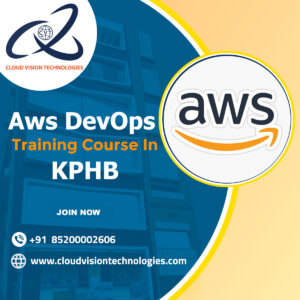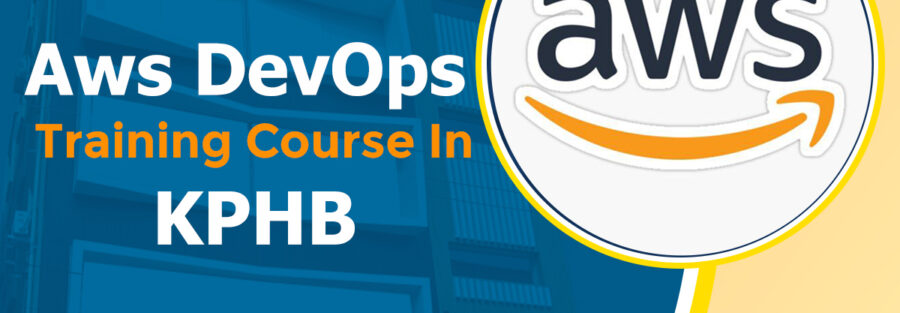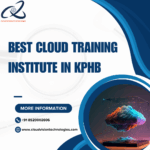Introduction to AWS DevOps:
DevOps has revolutionized the software development landscape, fostering collaboration between development and operations teams to deliver software faster, with fewer errors. AWS (Amazon Web Services) provides an extensive suite of tools to streamline DevOps practices, enabling automation, scalability, and efficient deployment processes. This blog explores the significance of AWS DevOps, its core components, and how it benefits organizations in their software development journey. Cloud Vision Technologies.
What is AWS DevOps?
AWS DevOps refers to the combination of Amazon Web Services and DevOps methodologies to improve software development and deployment. By leveraging AWS services, businesses can automate their software development lifecycle (SDLC), enhance collaboration between teams, and ensure high availability and scalability of applications. AWS provides a variety of tools for continuous integration, continuous delivery, infrastructure as code, monitoring, and security, making it an ideal platform for DevOps practices.

Why AWS for DevOps?
Scalability
One of the biggest advantages of AWS for DevOps is its scalability. AWS provides on-demand resources, allowing businesses to scale their applications up or down based on workload demands. Whether you need to handle a sudden spike in traffic or optimize costs during low usage periods, AWS auto-scaling ensures that your infrastructure adapts dynamically. Services like Amazon EC2, AWS Lambda, and Elastic Load Balancing (ELB) help maintain high availability and performance without manual intervention. This flexibility is crucial for DevOps teams managing dynamic application environments. Best AWS DevOps Course Kukatpally. AWS DevOps institute in KPHB.
Automation
AWS offers a comprehensive suite of automation tools that streamline the entire software development lifecycle. With AWS CodePipeline, AWS CodeBuild, and AWS CodeDeploy, teams can automate CI/CD workflows, reducing the need for manual deployments and testing. Infrastructure as Code (IaC) tools like AWS CloudFormation and AWS CDK allow organizations to define, provision, and manage infrastructure using code, making infrastructure deployment faster, more consistent, and less error-prone. This automation accelerates development cycles and enhances productivity, enabling DevOps teams to focus on innovation rather than routine maintenance. AWS DevOps institute in KPHB.
Security
Security is a top priority in DevOps, and AWS provides robust security mechanisms to protect applications and infrastructure. With AWS Identity and Access Management (IAM), teams can define strict access controls to ensure only authorized users and services interact with resources. AWS also offers encryption at rest and in transit, along with security monitoring tools like AWS Security Hub and AWS Shield to detect threats and mitigate attacks. Compliance with industry standards like ISO, SOC, and GDPR ensures that businesses can confidently deploy applications while maintaining security and regulatory compliance. AWS DevOps institute in KPHB.
Cost-effectiveness
AWS follows a pay-as-you-go pricing model, allowing businesses to optimize costs by only paying for the resources they use. Unlike traditional infrastructure, where companies must invest in expensive hardware upfront, AWS provides cost-effective solutions that scale with business needs. Services like AWS Savings Plans, Spot Instances, and AWS Cost Explorer help organizations manage expenses efficiently. This flexibility ensures that startups, enterprises, and DevOps teams can build and deploy applications without worrying about unnecessary infrastructure costs. AWS DevOps institute in KPHB.
Importance of AWS in DevOps
AWS plays a crucial role in modern DevOps due to its scalable infrastructure, extensive service offerings, and seamless integration capabilities. By using AWS, organizations can reduce operational overhead, automate repetitive tasks, and focus on innovation. The pay-as-you-go pricing model allows companies to optimize costs while benefiting from high-performance computing resources. AWS also offers a global network of data centers, ensuring low-latency and high availability for applications. AWS DevOps institute in KPHB.
Key AWS DevOps Services:
AWS offers a suite of DevOps services that help automate software development, deployment, and infrastructure management. These services enable organizations to build, test, and deploy applications seamlessly while ensuring high availability and scalability. Below are some of the key AWS DevOps services and their functionalities:
AWS CodePipeline
AWS CodePipeline is a fully managed continuous integration and continuous delivery (CI/CD) service that automates the software release process. It enables developers to build, test, and deploy applications efficiently by integrating with various source control and deployment tools such as AWS CodeCommit, GitHub, and Jenkins. CodePipeline ensures smooth code transitions from development to production, minimizing manual interventions and reducing deployment risks. AWS DevOps institute in KPHB.
AWS CodeBuild
AWS CodeBuild is a cloud-based continuous integration (CI) service that compiles source code, runs tests, and packages software for deployment. It eliminates the need for managing build servers, as AWS handles the underlying infrastructure. CodeBuild supports multiple programming languages and build environments, allowing developers to create customizable build workflows. With scalable and parallel execution, it ensures faster software delivery while maintaining code quality. AWS DevOps institute in KPHB.

AWS CodeDeploy
AWS CodeDeploy automates the deployment of applications to Amazon EC2 instances, AWS Lambda functions, and on-premises servers. It reduces downtime and minimizes human errors by handling complex deployment processes automatically. CodeDeploy supports both rolling and blue-green deployment strategies, ensuring minimal service interruptions while updating applications. It also provides real-time monitoring and rollback capabilities, enhancing deployment reliability. AWS DevOps institute in KPHB.
AWS CodeCommit
AWS CodeCommit is a secure, scalable, and fully managed Git-based source control service that allows developers to store and manage their code repositories. It eliminates the need for hosting and maintaining Git servers, providing seamless collaboration among team members. CodeCommit integrates with AWS DevOps tools such as CodePipeline and CodeBuild, enabling automated build and deployment workflows. Its strong encryption and IAM-based access control enhance security. AWS DevOps institute in KPHB.
AWS Elastic Beanstalk
AWS Elastic Beanstalk simplifies application deployment by automatically handling infrastructure provisioning, scaling, and monitoring. Developers can deploy applications without worrying about underlying hardware configurations. It supports multiple programming languages, including Java, Python, PHP, Node.js, and Ruby, making it a versatile choice for different development teams. Elastic Beanstalk also provides built-in auto-scaling, ensuring applications can handle variable workloads efficiently. AWS DevOps institute in KPHB.
AWS CloudFormation
AWS CloudFormation allows organizations to automate infrastructure provisioning using code. It follows the Infrastructure as Code (IaC) approach, enabling developers to define cloud resources in a template file and deploy them consistently across environments. CloudFormation eliminates manual configuration errors, accelerates infrastructure deployment, and supports version-controlled infrastructure management, making it a vital tool for DevOps teams. AWS DevOps institute in KPHB.
AWS CloudWatch
AWS CloudWatch is a monitoring and observability service that provides real-time insights into application performance, resource utilization, and system health. It collects and analyzes logs, metrics, and event data from AWS resources and applications, enabling proactive troubleshooting and performance optimization. CloudWatch also allows setting up alarms and automated responses to maintain system reliability and reduce downtime.AWS DevOps institute in KPHB.
AWS Lambda
AWS Lambda is a serverless computing service that runs code in response to events without provisioning or managing servers. It supports various programming languages, including Python, Java, and Node.js, making it easy to integrate into DevOps workflows. Lambda is ideal for executing automated tasks, processing real-time data, and integrating with AWS services like API Gateway and DynamoDB. Its pay-per-use pricing model optimizes costs by charging only for execution time. AWS DevOps institute in KPHB.
Benefits of Using AWS for DevOps
AWS offers several advantages that make it an ideal choice for DevOps implementation:
Scalability: AWS services are designed to scale automatically based on demand. This ensures that applications can handle varying workloads efficiently, reducing the risk of downtime during traffic spikes. Services like Amazon EC2 Auto Scaling and AWS Lambda dynamically allocate resources, optimizing performance while maintaining cost efficiency.
Automation: AWS simplifies automation through a variety of tools, reducing the need for manual intervention. AWS Lambda allows serverless execution of tasks, AWS CloudFormation automates infrastructure provisioning, and AWS CodePipeline streamlines software delivery pipelines. This automation enhances efficiency and reduces human errors in deployment processes. AWS DevOps institute in KPHB.
Cost-Effectiveness: AWS follows a pay-as-you-go pricing model, meaning businesses only pay for the resources they consume. This eliminates unnecessary expenditures on underutilized infrastructure. Additionally, AWS offers cost optimization tools like AWS Compute Optimizer and AWS Budgets, enabling organizations to analyze and manage their cloud spending effectively. AWS DevOps institute in KPHB.
Security: AWS provides built-in security features and compliance certifications to ensure the protection of applications and data. Services like AWS Identity and Access Management (IAM) allow organizations to control access to resources, while AWS Secrets Manager securely manages sensitive credentials. AWS also adheres to industry standards such as GDPR, HIPAA, and ISO, reinforcing data security and compliance. AWS DevOps institute in KPHB.
Faster Deployment: The CI/CD tools provided by AWS enable rapid software development and deployment. AWS CodePipeline automates the build, test, and deployment phases, reducing the time required to release new features. This ensures that businesses can respond quickly to market demands and customer feedback, improving overall agility.
Flexibility: AWS supports multiple programming languages, frameworks, and third-party integrations. Whether developers work with Java, Python, Node.js, or .NET, AWS provides a seamless environment to develop and deploy applications. The flexibility to integrate with other DevOps tools, such as Jenkins, GitHub, and Terraform, further enhances workflow customization. AWS DevOps institute in KPHB.
Monitoring and Logging: AWS CloudWatch and AWS X-Ray offer comprehensive monitoring and logging capabilities, enabling teams to track system performance in real time. CloudWatch collects and visualizes metrics, while X-Ray helps trace requests and diagnose bottlenecks within applications. These insights facilitate proactive troubleshooting and optimization of system performance. AWS DevOps institute in KPHB.

Implementing AWS DevOps
Implementing AWS DevOps involves several steps, including setting up a CI/CD pipeline, automating infrastructure, and monitoring applications. Below is a typical workflow for deploying applications using AWS DevOps services: AWS DevOps institute in KPHB.
Version Control: The first step in AWS DevOps is to store code in a version control system. AWS CodeCommit is a fully managed Git repository service that enables teams to collaborate on source code. Alternatively, developers can use third-party repositories like GitHub or Bitbucket to maintain version control and track changes efficiently.
Continuous Integration: After version control, AWS CodeBuild plays a vital role in compiling code, running automated tests, and generating deployment-ready artifacts. This ensures that new code changes are integrated seamlessly, preventing bugs and inconsistencies before deployment. AWS DevOps institute in KPHB.
Continuous Delivery: AWS CodeDeploy and AWS Elastic Beanstalk help automate deployments across various environments. CodeDeploy facilitates rolling updates to EC2 instances, on-premises servers, or Lambda functions, minimizing downtime. Elastic Beanstalk, on the other hand, abstracts infrastructure complexities, allowing developers to focus on application logic. AWS DevOps institute in KPHB.
Infrastructure as Code (IaC): To maintain consistency and automate infrastructure provisioning, AWS CloudFormation and Terraform define infrastructure using declarative configuration files. This eliminates manual setup efforts and ensures that resources are deployed consistently across different environments. AWS DevOps institute in KPHB.
Monitoring and Logging: Effective monitoring is crucial for identifying performance bottlenecks and potential issues. AWS CloudWatch provides real-time metrics, logs, and alarms to track application health. AWS X-Ray helps trace requests within applications, enabling developers to diagnose and resolve issues faster. AWS DevOps institute in KPHB.
Security and Compliance: AWS Identity and Access Management (IAM) enforces role-based access control to secure AWS resources. AWS Security Hub provides a unified view of security threats and compliance violations, ensuring organizations adhere to industry best practices. AWS DevOps institute in KPHB.
Scaling and Optimization: To handle fluctuating workloads efficiently, AWS EC2 Auto Scaling dynamically adjusts computing resources based on traffic patterns. AWS Lambda allows for event-driven execution without provisioning servers, optimizing resource utilization and reducing costs. AWS DevOps institute in KPHB.
Best Practices for AWS DevOps
To ensure the success of AWS DevOps adoption, organizations should follow best practices such as:
Automate Everything: Leveraging AWS automation tools can significantly reduce manual errors, improve efficiency, and enhance consistency across environments. AWS services such as AWS Lambda, AWS CloudFormation, and AWS CodePipeline help automate testing, deployments, infrastructure provisioning, and monitoring, allowing teams to focus on innovation rather than repetitive tasks. AWS DevOps institute in KPHB.
Implement CI/CD Pipelines: Establishing robust CI/CD pipelines ensures seamless software releases with minimal disruptions. AWS CodePipeline, AWS CodeBuild, and AWS CodeDeploy automate the build, test, and deployment processes, improving the overall development lifecycle. A well-defined CI/CD pipeline accelerates software delivery and helps maintain a high level of code quality. AWS DevOps institute in KPHB.
Use Infrastructure as Code (IaC): Defining infrastructure using AWS CloudFormation or Terraform enables teams to maintain consistency across different environments. IaC eliminates manual configurations, reduces deployment risks, and allows infrastructure changes to be version-controlled, ensuring better manageability and traceability.
Monitor Performance: Continuous monitoring is essential for identifying issues before they impact end-users. AWS CloudWatch provides real-time performance metrics, AWS X-Ray offers request tracing, and AWS Trusted Advisor gives recommendations for best practices. Proactive monitoring ensures system reliability, security, and performance optimization.
Enhance Security: Security should be an integral part of DevOps practices. AWS Identity and Access Management (IAM) helps implement role-based access control, AWS Secrets Manager securely manages credentials, and AWS Security Hub centralizes security management. Regular security audits and compliance checks ensure that applications remain secure against evolving threats. AWS DevOps institute in KPHB.
Optimize Costs: Managing cloud spending effectively is crucial for cost efficiency. AWS Cost Explorer and AWS Compute Optimizer analyze resource usage and suggest optimizations. By identifying underutilized resources and right-sizing instances, businesses can significantly reduce operational expenses while maintaining performance.
Leverage Serverless Architectures: Serverless computing eliminates the need for infrastructure management, reducing operational overhead. AWS Lambda, AWS Fargate, and Amazon API Gateway enable developers to run applications without provisioning servers. This results in better scalability, cost savings, and faster application deployments.
Challenges in AWS DevOps Implementation:
Despite its benefits, AWS DevOps implementation comes with challenges such as:
Learning Curve: AWS has a vast array of services, which can be overwhelming for beginners. AWS DevOps institute in KPHB.
Cost Management: Without proper monitoring, AWS costs can escalate due to overprovisioning of resources. AWS DevOps institute in KPHB.
Security Risks: Misconfigured security policies can expose applications to vulnerabilities.
Complexity in Automation: Managing complex CI/CD pipelines and infrastructure automation requires expertise.
Integration Issues: Ensuring seamless integration between different AWS services and third-party tools can be challenging. AWS DevOps institute in KPHB.
AWS DevOps institute in KPHB:
For professionals in the KPHB area of Hyderabad seeking to enhance their skills in AWS DevOps, several reputable training institutes offer comprehensive courses tailored to industry demands. One such institute is Cloud Vision Technologies, which provides an in-depth AWS DevOps course designed to equip learners with both theoretical knowledge and practical experience. Their curriculum covers essential AWS services and DevOps practices, ensuring participants are well-prepared for real-world challenges. The course emphasizes hands-on learning, allowing students to work on real-world projects that mirror industry scenarios. Additionally, Cloud Vision Technologies offers flexible learning options, including both classroom-based and online training, catering to the diverse needs of students and working professionals. AWS DevOps institute in KPHB.

Conclusion:
AWS DevOps is a powerful approach for organizations seeking to improve software development efficiency, scalability, and security. By leveraging AWS DevOps services, businesses can automate processes, enhance collaboration, and accelerate software delivery. While challenges exist, following best practices and using AWS tools effectively can help organizations achieve a seamless DevOps transformation. Whether you’re a startup or an enterprise, adopting AWS DevOps can significantly enhance your software development lifecycle and drive innovation in the cloud era. AWS DevOps institute in KPHB.
Address: Cloud Vision Technologies
Location: Samhitha Enclave, 3rd floor, KPHB Phase 9, Kukatpally, Hyderabad, Telangana – 500072
Contact Number : +91 8520002606
Mail ID: info@cloudvisiontechnologies.com
Website: https://cloudvisiontechnologies.com




